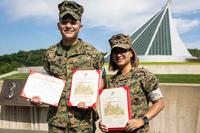As a country founded by immigrants hundreds of years ago, many individuals still flock to the U.S. today seeking political freedom and the opportunity to achieve their goals. America remains a land of opportunities, and because many foreigners from all over the world come to live in the U.S., cultural diversity is cited as one of the country's strengths.
The same applies to the U.S military today. Since the Revolutionary War, legal permanent residents are eligible to enlist in the military. Roughly 35,000 non-citizens are serving in active-duty military, and about 8,000 join each year.
Non-citizen service members offer several benefits to the military. They are more diverse linguistically and culturally than citizen recruits, which was particularly valuable as the U.S faced the challenges of the Global War on Terrorism.
Also, according to military research, once non-citizens have joined the military, they are far more likely to complete their enlistment obligations successfully than their U.S.-born counterparts. Thirty-six-month attrition rates for non-citizens are between nine and 20 percentage points lower than those for white citizens, the largest demographic group in the military.
"The benefits the Air Force offers are way too good to pass up," said Senior Airman Duzaghi Tafie, 509th Force Support Squadron (FSS) relocations representative. "When I was back home in Africa, the rules and way of life was very similar to that of the military, so I'm basically getting paid more and obtaining benefits without having the culture shock. I'm able to get an education, and now that I'm a citizen, I can reenlist and extend my military career."
Just as non-citizen service members offer benefits to the military, the military service provides opportunities for recruits, particularly in the path to citizenship.
"Since 9/11, there has been a waiver for naturalization fees for military members serving during periods of hostilities," said Tina Brant, 509th FSS naturalization representative. "That saves airmen at least several hundreds of dollars.
"The time to process the applications is also much faster for troops than civilians because the Department of Defense and USCIS [U.S. Citizenship and Immigration Services] have a memorandum of agreement to expedite military applications. And if they don't receive their citizenship during their first enlistment, they will not be allowed to reenlist."
Other restrictions non-citizens encounter until they obtain their U.S citizenship include:
- Reenlistment: unable to reenlist
- Selective reenlistment bonuses: will not receive until they reenlist
- Airmen Leadership School: can only attend if they obtain the retainability
- Promotion: unable to sew on staff sergeant until they have attended ALS
- Retraining: cannot obtain without U.S citizenship
- Assignments: ineligible for overseas and security clearance-required assignments
- Security clearance: cannot obtain without citizenship
- Palace chase/palace front: ineligible to apply without citizenship
"Airmen can begin the application process as soon as they get to tech school, because the time in service was waived by the president since we have been in a period of hostility," Brant said.
Military members can contact the naturalization representative at the military personnel section at their base. Each naturalization representative is there to help non-citizens through the process of naturalization by providing them with the information and forms they need to submit. Once the airmen have completed the required forms (N-400 Application for Naturalization, N-426 Request for Certification of Military, G-325B USCIS Document Checklist) their POC will submit them to the USCIS Nebraska Service Center.
"After the application has been submitted, airmen might be asked to go get their fingerprints taken at the nearest field office," Brant said. "After that, they will be scheduled for a citizenship interview where they will perform a test to verify they have common knowledge of the English language and its history.
"The application may take up to six to eight months to process. Once the airmen receive their citizenship approval, they need to provide the original certification of naturalization to the MPS for update in the Military Personnel Data System as a final step to the process."
Demographic trends and new incentives (including new language programs and expedited citizenship) make it likely that the number of non-citizens within the military's ranks will grow. Non-citizen recruits will provide the services with a more richly diverse force, not only racially and ethnically, but also in terms of language and culture.
Interested in Joining the Military?
We can put you in touch with recruiters from the different military branches. Learn about the benefits of serving your country, paying for school, military career paths, and more: sign up now and hear from a recruiter near you.















